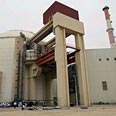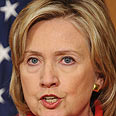

Russia will this year start up the reactor at Iran's long-delayed Bushehr nuclear power plant, the head of Russia's state nuclear corporation said on Thursday.
Russia agreed to build Iran the 1,000 megawatt nuclear power plant at Bushehr 15 years ago, but delays have haunted the $1 billion project and diplomats say Moscow has used it as a lever in relations with Tehran.
"2010 is the year of Bushehr," Sergei Kiriyenko, the head of the Rosatom state nuclear corporation, told reporters after a cabinet meeting in Moscow.
"There is absolutely no doubt that it will be built this year. Everything is going according to schedule," he said.
Kiriyenko declined to answer a question on when exactly the plant would be started up.
Two sources closely involved with the project told Reuters last year that Russia planned to start up the power station in March 2010.
Also on Thursday, US Secretary of State Hillary Clinton said major powers are united in working toward pressuring Iran over its nuclear program, despite many signals that China is reluctant to impose more sanctions.
Senior diplomats from Britain, China, France, Germany, Russia and the United States met in New York on Saturday to discuss the possibility of placing more international sanctions on Iran.
"We are unified in our resolve to work toward pressure on Iran in the face of their continuing rejection of the overtures by the international community," Clinton said at a news conference, calling Saturday's meeting a "productive step."
Iran has a very clear choice
Earlier this month China argued in public that now was not the right time to place further sanctions on Iran and it sent only a low level official to attend Saturday's meeting while the other powers sent senior foreign ministry officials.
"Let me be clear: we will not be waited out and we will not back down," Clinton said. "Iran has a very clear choice between continued isolation and living up to its international obligations."
The United States and major European Union countries suspect Iran wants to build a nuclear bomb under cover of its civilian nuclear program, a claim Tehran vehemently denies.
Russia, a veto-wielding permanent member of the United Nations Security Council, has so far refused to publicly support the threat of additional sanctions against Iran.
The atomic power station was once a source of disagreement between Russia and the West, which suspected the Islamic Republic could try to use it to build nuclear weapons.
But in recent years, the United States has dropped its opposition and says the plant removes any need for Iran to have its own enrichment program.
Russia says the plant is purely civilian and cannot be used for any weapons program as it will come under International Atomic Energy Agency supervision. Iran will have to return all spent fuel rods to Russia.
Russia agreed to build the plant in 1995 on the site of an earlier project begun in the 1970s by German firm Siemens. The Siemens' project was disrupted by Iran's 1979 Islamic revolution and the 1980-88 Iran-Iraq war.















